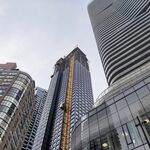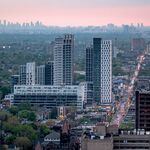Pep'rJack
Active Member
.
Most NYC drivers oppose mayor's new $8 fee: survey
by Joan Gralla
May 3, 2007
http://news.yahoo.com/s/nm/20070503/us_nm/newyorkcity_traffic_dc
NEW YORK (Reuters) - New York drivers opposed Mayor Michael Bloomberg's new traffic-fighting $8 fee for taking a car into Manhattan, a survey said on Thursday, and almost half of the group said it would force them out of their cars.
By a margin of 43 percent to 51 percent, the 500 drivers surveyed on behalf of a business group came out against the so-called congestion pricing strategy.
The Republican mayor says the fee is needed to improve air quality and raise $31 billion for new tunnels, commuter rail links, subways and buses.
The state government would have to approve the new fee, which was one of 127 energy conserving and greenhouse gas-cutting plans Bloomberg unveiled on April 22, which was Earth Day.
The poll revealed just how persuasive the mayor might have to be though his plan is supported by over 70 business, civic and green groups. Business backers include the Partnership for New York City, which commissioned the survey. It says traffic jams cost the regional economy $13 billion a year.
A majority of drivers still opposed the new fees, by a 47 to 45 percent margin, even after the pollsters explained the potential benefits, from cleaner air to less traffic.
The motorists also were told that Londoners overwhelmingly approved their congestion pricing plan, launched around 2003.
Only 35 percent of the drivers supported Bloomberg's plan versus 61 percent against it when told about the $8 fee.
Some legislators who represent the city's four outer boroughs have slammed the proposed congestion fee. They say the plan hits poor residents the hardest, explaining they often must drive as commuting by bus or subway just takes too long.
WHAT'S YOUR MOTIVATION?
But the survey contradicted that understanding of what motivates people to drive.
"In a clear indication that saving time is not a primary reason for driving, 61 percent of drivers say that mass transit would be as fast or faster," Kathryn Wylde, who runs the Partnership for New York City, said in a statement. Some 66 percent of motorists from Queens and Brooklyn share that view.
The average commute was just 30 minutes, the survey said. That is much shorter than the trips sometimes endured by people who live in more sprawling cities, such as Los Angeles.
Even if an average Manhattan commute was doubled, only 48 percent of the drivers would consider an alternative, according to the survey, which had a 4.4 percent margin of error.
But 46 percent said they would use another option if they had to pay an $8 fee, the poll added. It was conducted from March 12 to April 4 -- before Bloomberg unveiled his plan, which would let motorists deduct the new fee from bridge and tunnel tolls.
A total of 267,186 commuters from across the region drive to jobs in Manhattan's central business district, which runs from 60th Street down to the Battery, the island's southern tip, the survey said, citing U.S. Census data.
New York City has the biggest U.S. mass transit system with nearly 8 million daily riders. Drivers make up just 16 percent of all the commuters who work in this dense section of Manhattan, the survey said.
Just over half -- 53 percent -- of these motorists live in one of New York City's five boroughs. Staten Island contributes the most car commuters -- 31 percent. Queens sends in 17 percent, followed by the Bronx, with 15 percent and Brooklyn, with 11 percent, according to the survey.
"Ironically, drivers who live in Manhattan, which offers the best mass transit system, were more likely than those from the other boroughs to say that they use a car because mass transit is not easily available," Wylde added.
.
Most NYC drivers oppose mayor's new $8 fee: survey
by Joan Gralla
May 3, 2007
http://news.yahoo.com/s/nm/20070503/us_nm/newyorkcity_traffic_dc
NEW YORK (Reuters) - New York drivers opposed Mayor Michael Bloomberg's new traffic-fighting $8 fee for taking a car into Manhattan, a survey said on Thursday, and almost half of the group said it would force them out of their cars.
By a margin of 43 percent to 51 percent, the 500 drivers surveyed on behalf of a business group came out against the so-called congestion pricing strategy.
The Republican mayor says the fee is needed to improve air quality and raise $31 billion for new tunnels, commuter rail links, subways and buses.
The state government would have to approve the new fee, which was one of 127 energy conserving and greenhouse gas-cutting plans Bloomberg unveiled on April 22, which was Earth Day.
The poll revealed just how persuasive the mayor might have to be though his plan is supported by over 70 business, civic and green groups. Business backers include the Partnership for New York City, which commissioned the survey. It says traffic jams cost the regional economy $13 billion a year.
A majority of drivers still opposed the new fees, by a 47 to 45 percent margin, even after the pollsters explained the potential benefits, from cleaner air to less traffic.
The motorists also were told that Londoners overwhelmingly approved their congestion pricing plan, launched around 2003.
Only 35 percent of the drivers supported Bloomberg's plan versus 61 percent against it when told about the $8 fee.
Some legislators who represent the city's four outer boroughs have slammed the proposed congestion fee. They say the plan hits poor residents the hardest, explaining they often must drive as commuting by bus or subway just takes too long.
WHAT'S YOUR MOTIVATION?
But the survey contradicted that understanding of what motivates people to drive.
"In a clear indication that saving time is not a primary reason for driving, 61 percent of drivers say that mass transit would be as fast or faster," Kathryn Wylde, who runs the Partnership for New York City, said in a statement. Some 66 percent of motorists from Queens and Brooklyn share that view.
The average commute was just 30 minutes, the survey said. That is much shorter than the trips sometimes endured by people who live in more sprawling cities, such as Los Angeles.
Even if an average Manhattan commute was doubled, only 48 percent of the drivers would consider an alternative, according to the survey, which had a 4.4 percent margin of error.
But 46 percent said they would use another option if they had to pay an $8 fee, the poll added. It was conducted from March 12 to April 4 -- before Bloomberg unveiled his plan, which would let motorists deduct the new fee from bridge and tunnel tolls.
A total of 267,186 commuters from across the region drive to jobs in Manhattan's central business district, which runs from 60th Street down to the Battery, the island's southern tip, the survey said, citing U.S. Census data.
New York City has the biggest U.S. mass transit system with nearly 8 million daily riders. Drivers make up just 16 percent of all the commuters who work in this dense section of Manhattan, the survey said.
Just over half -- 53 percent -- of these motorists live in one of New York City's five boroughs. Staten Island contributes the most car commuters -- 31 percent. Queens sends in 17 percent, followed by the Bronx, with 15 percent and Brooklyn, with 11 percent, according to the survey.
"Ironically, drivers who live in Manhattan, which offers the best mass transit system, were more likely than those from the other boroughs to say that they use a car because mass transit is not easily available," Wylde added.
.




